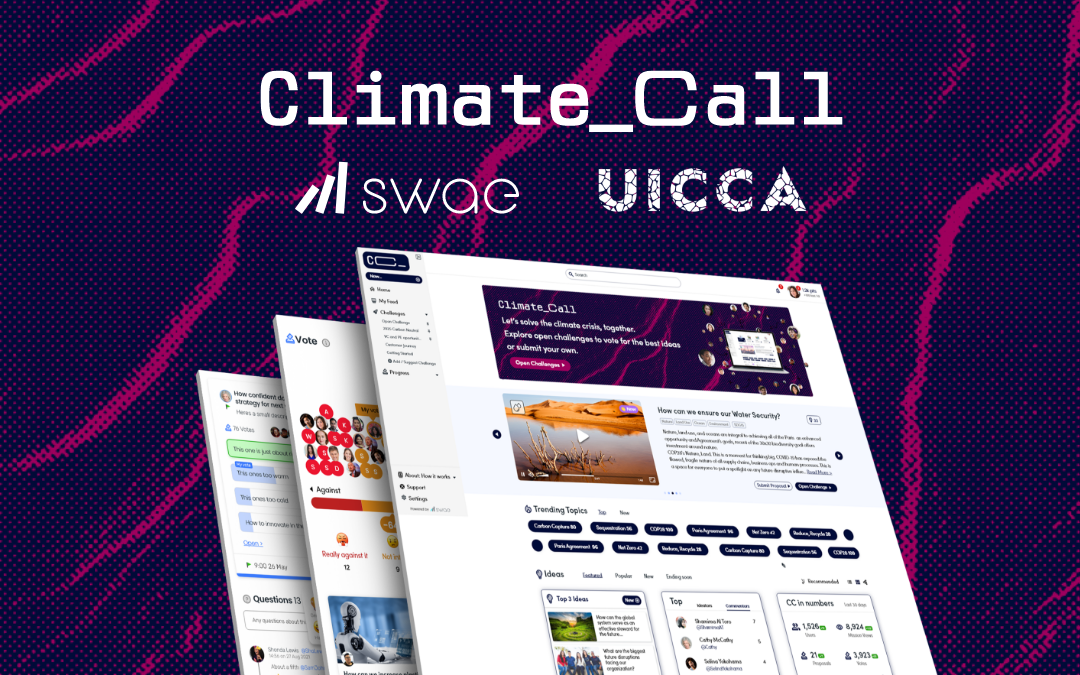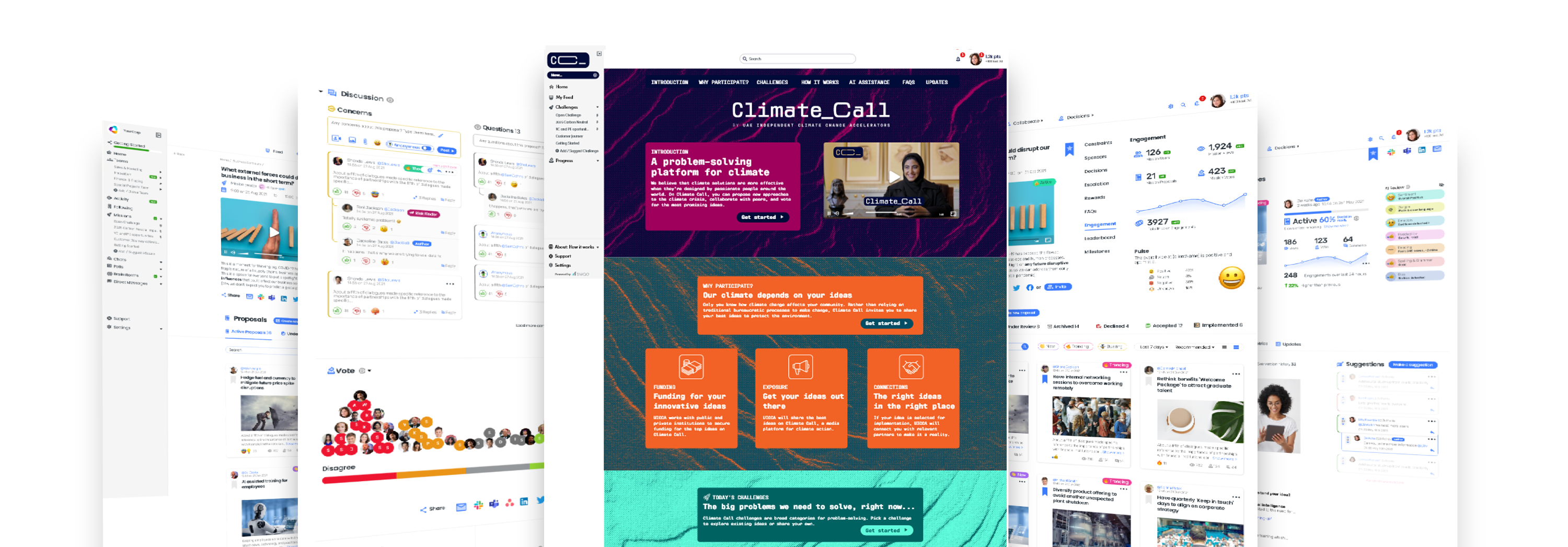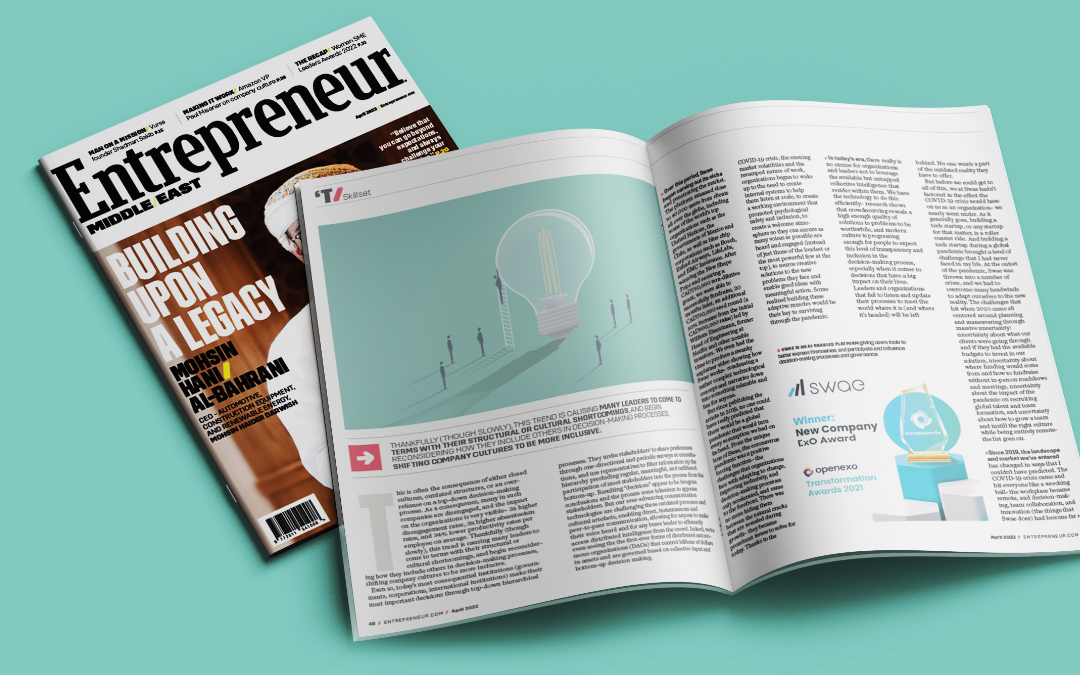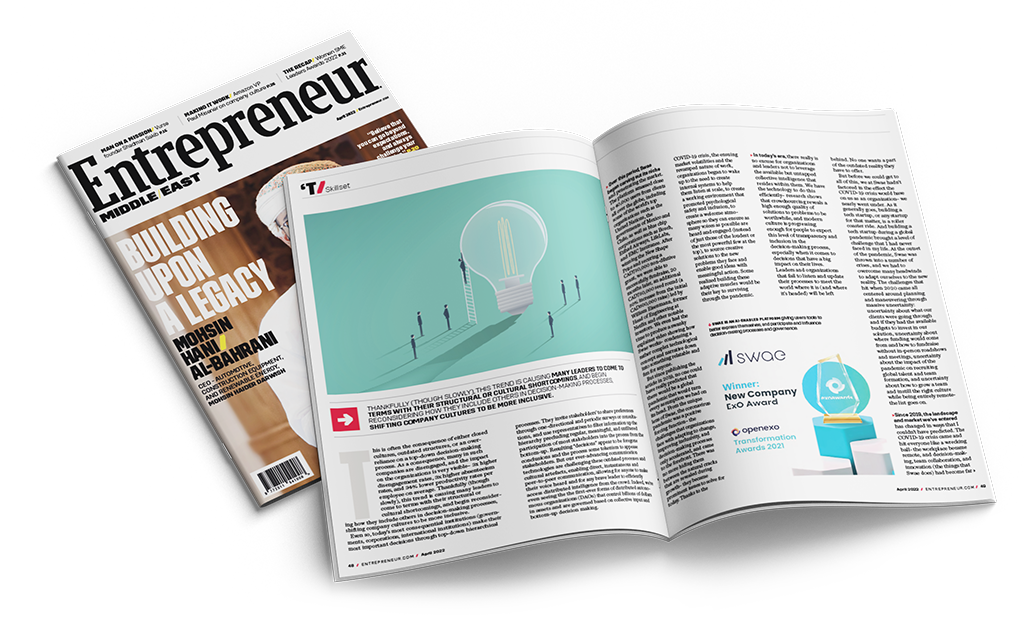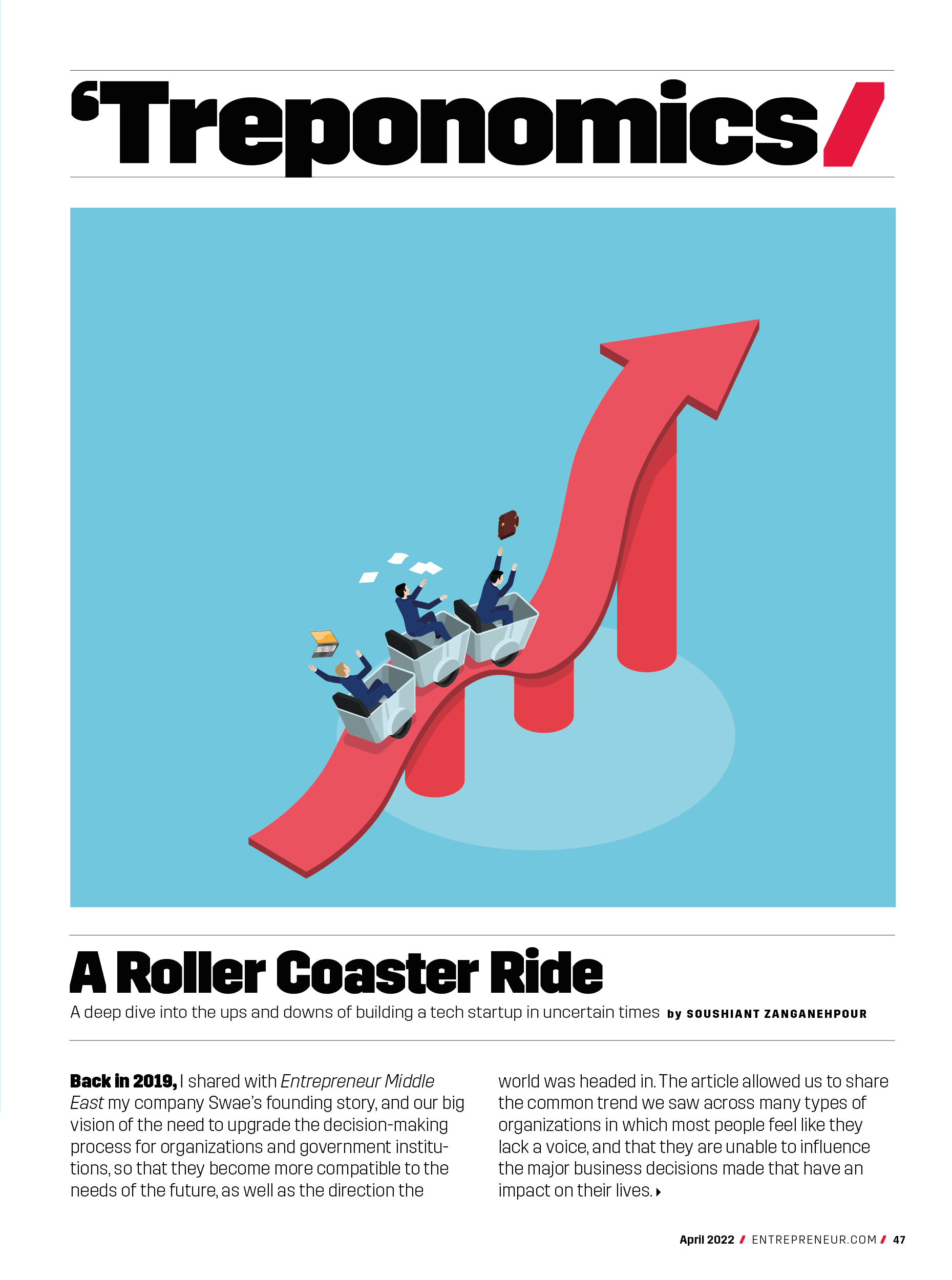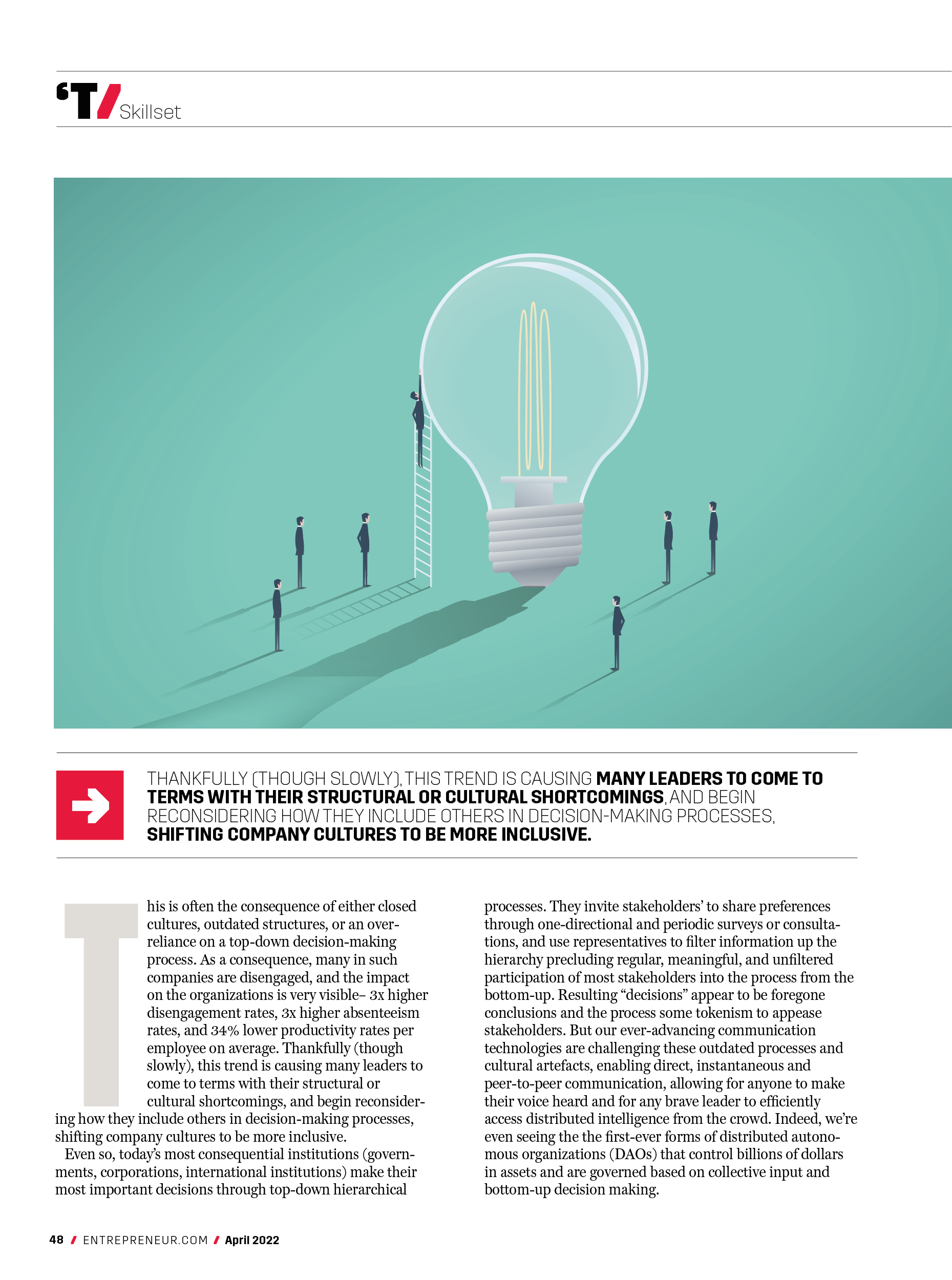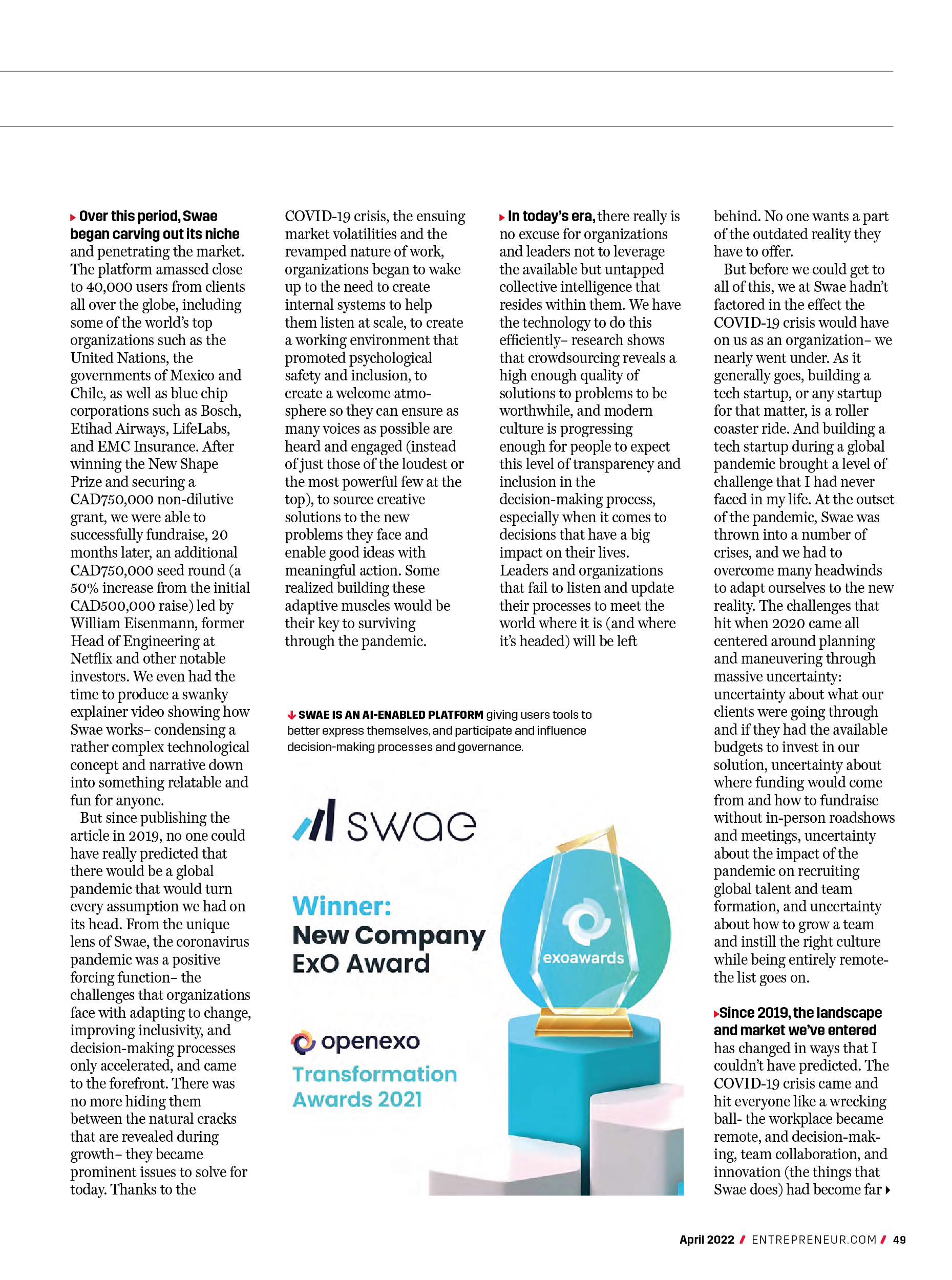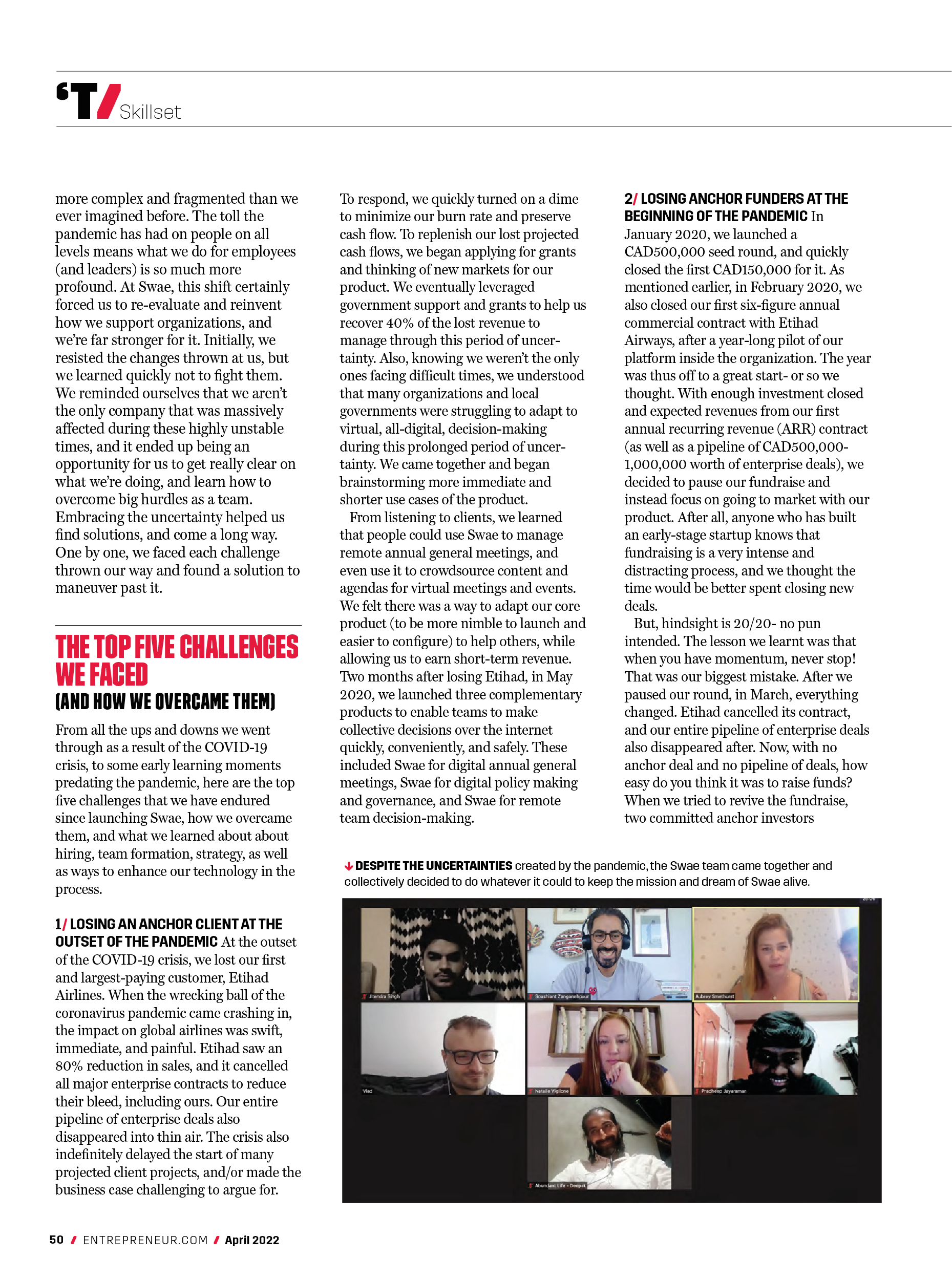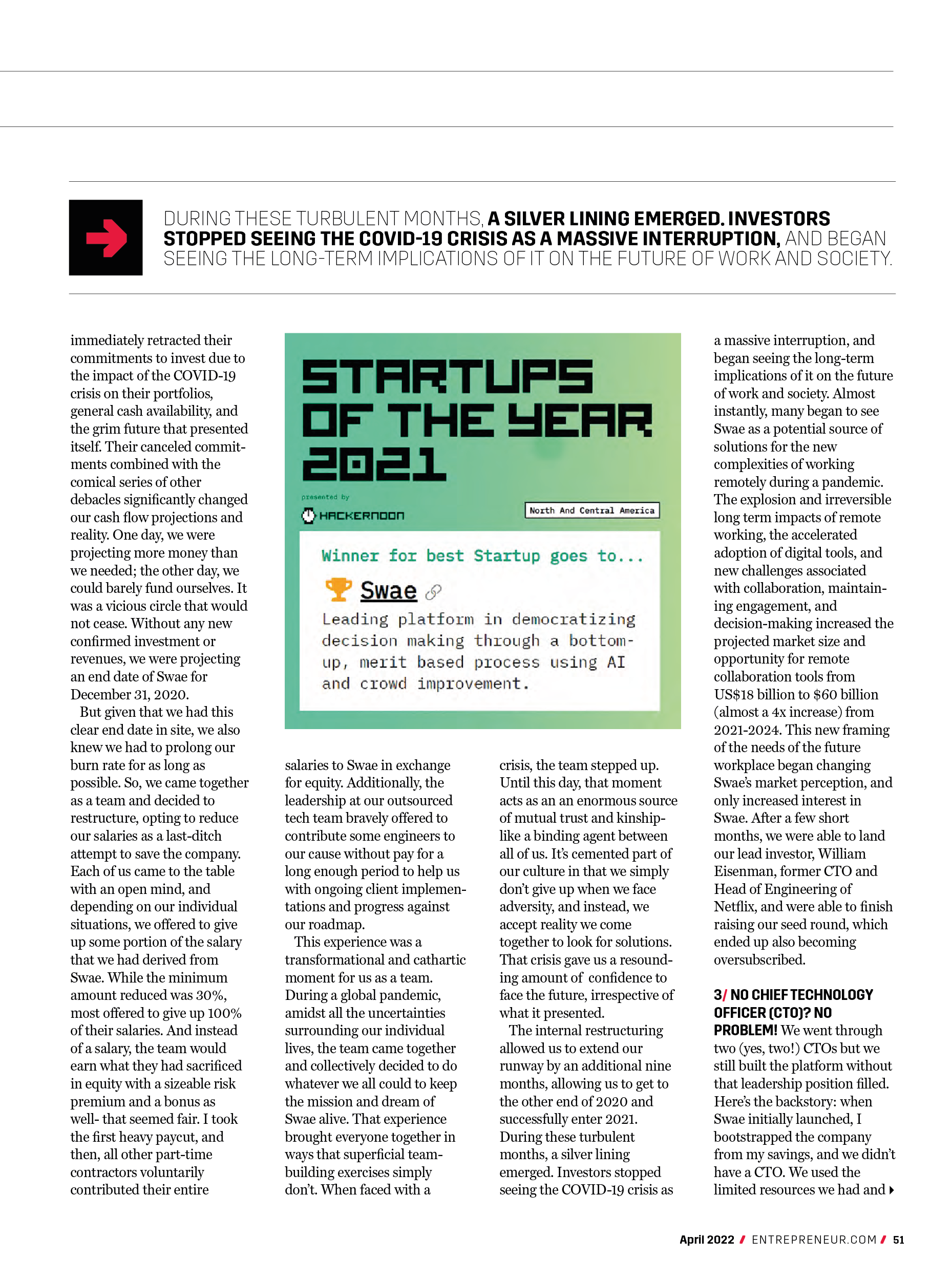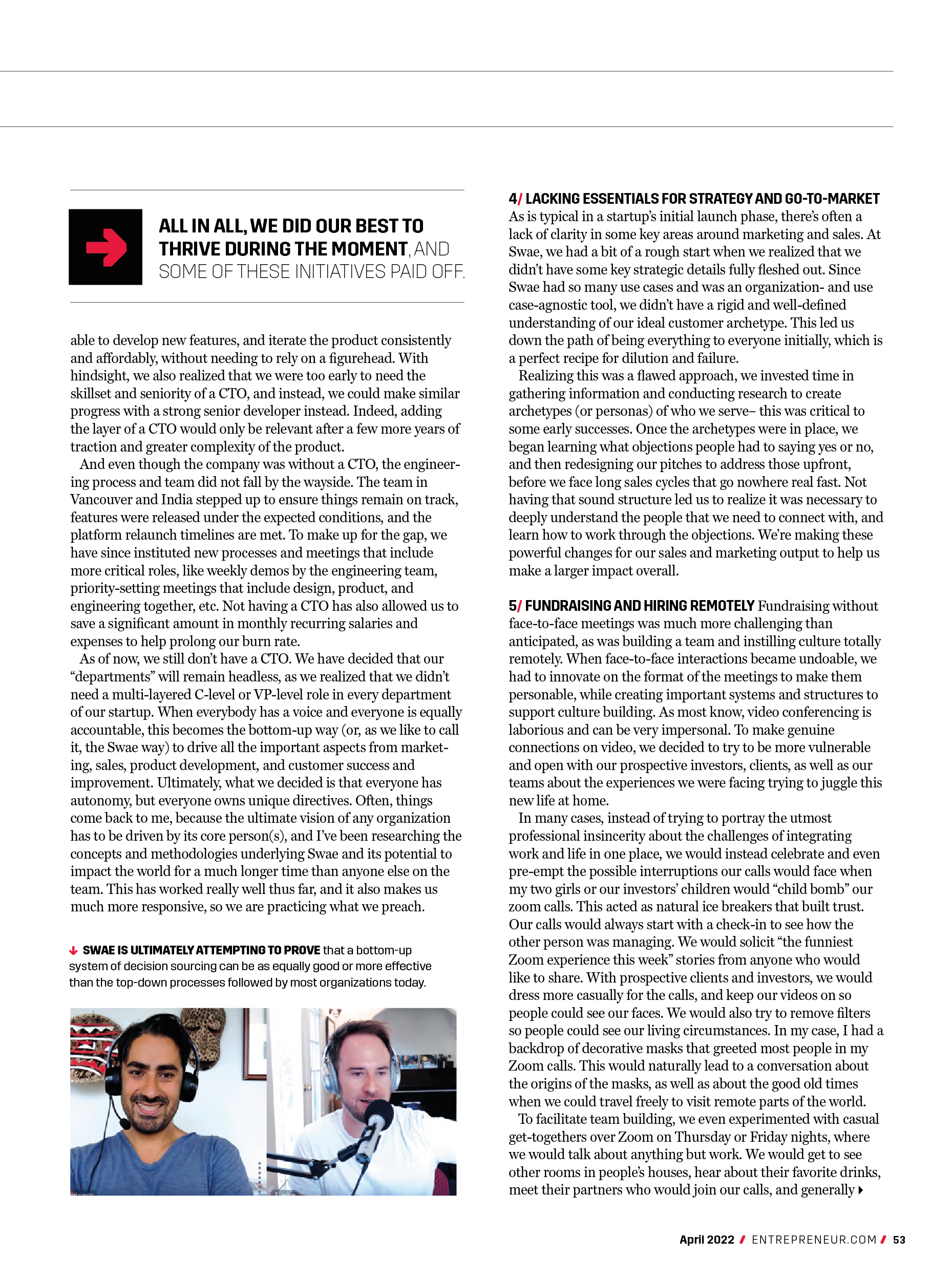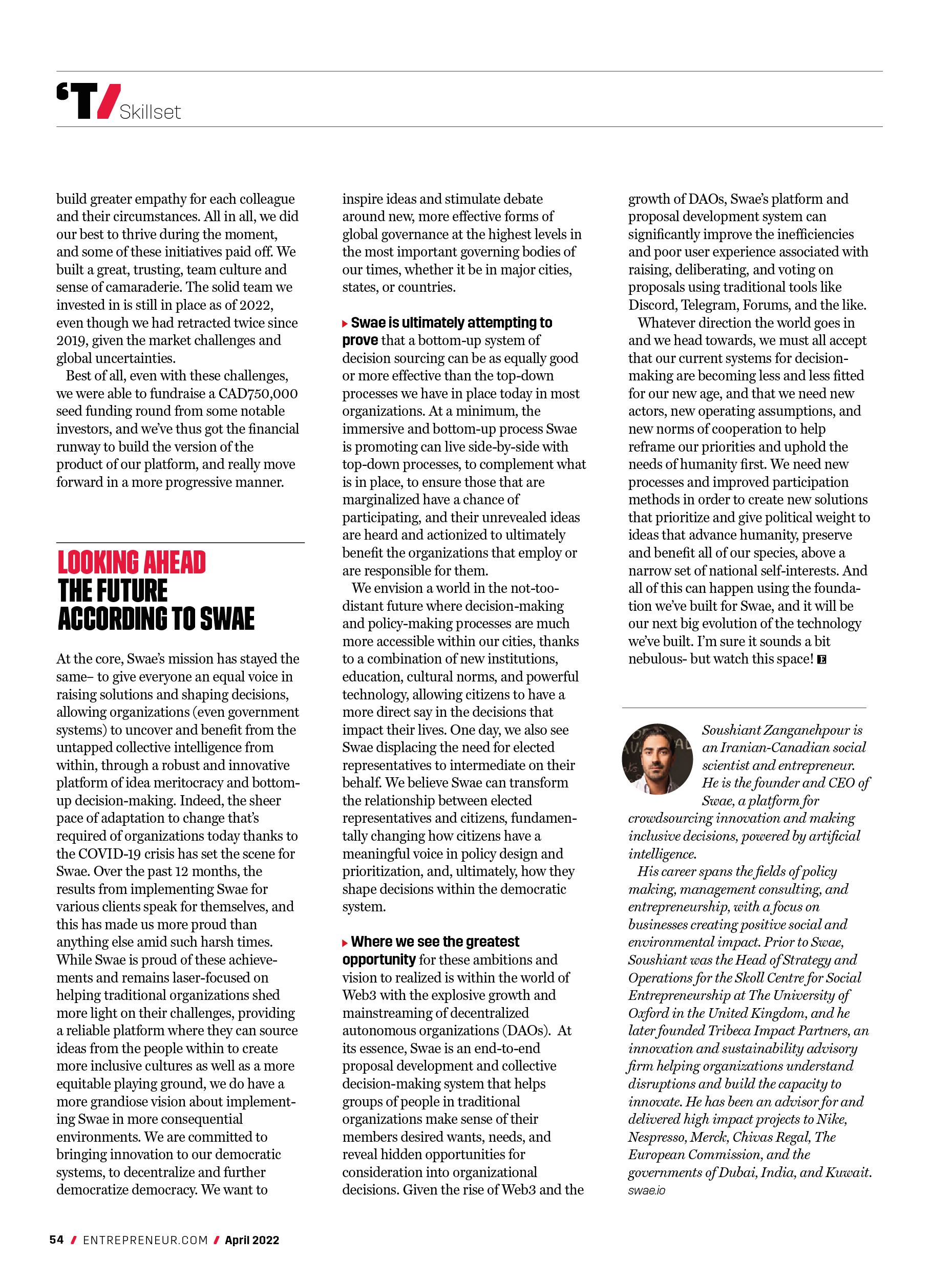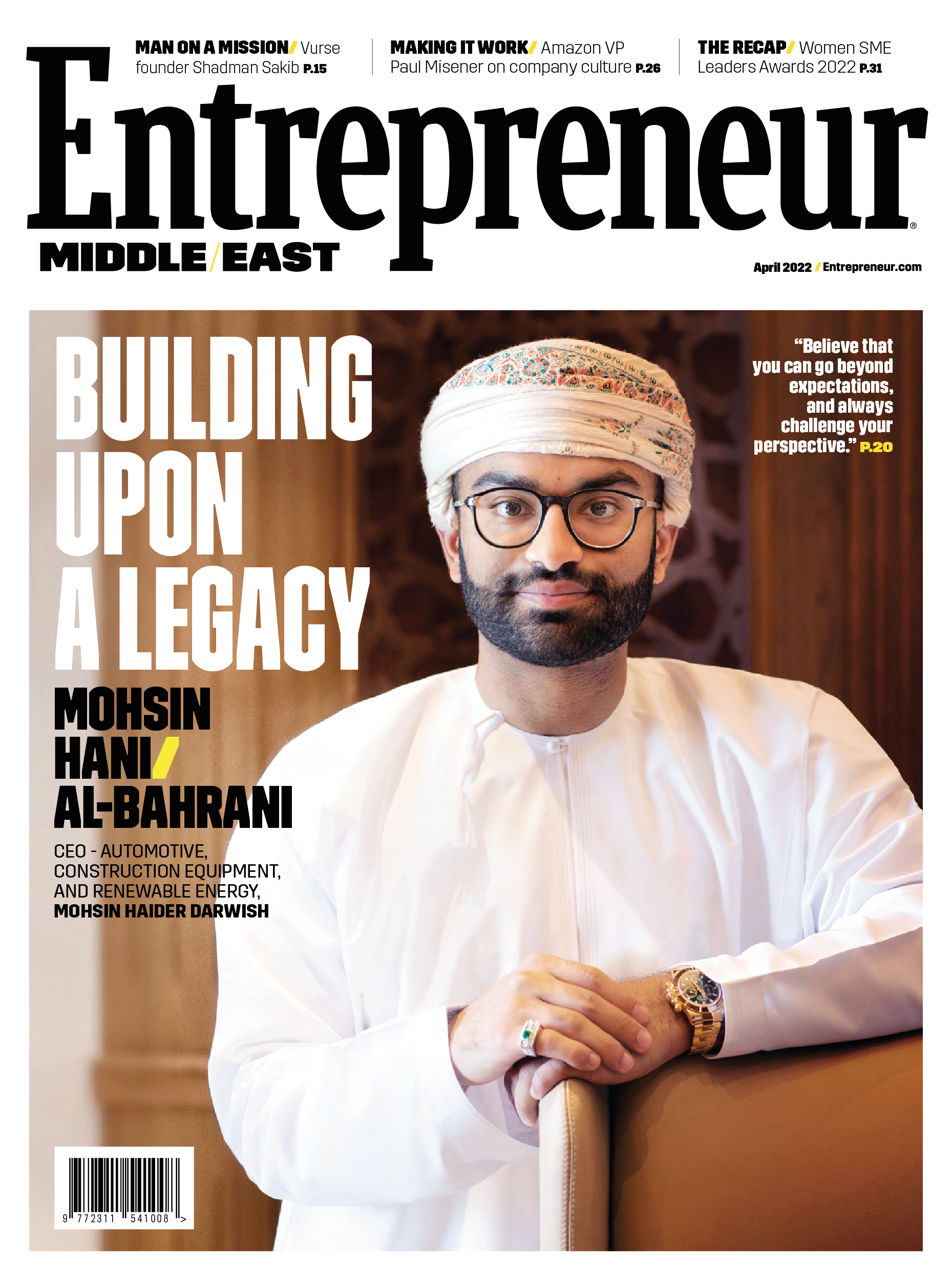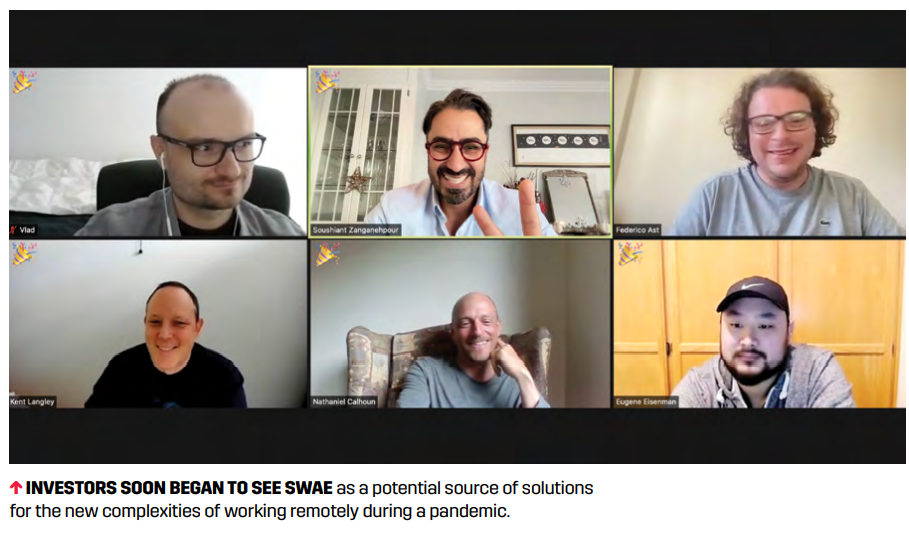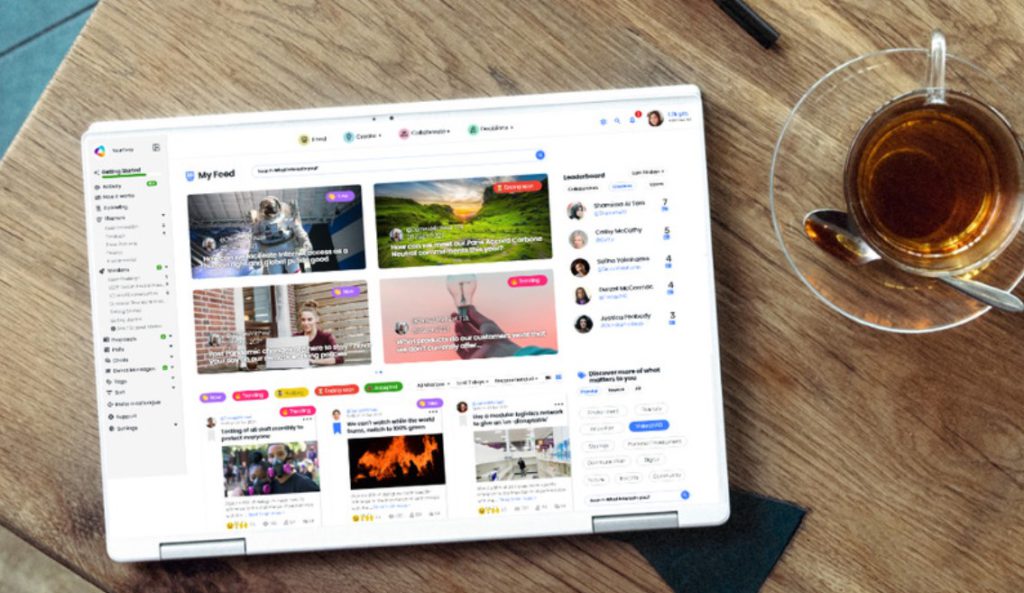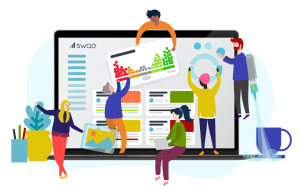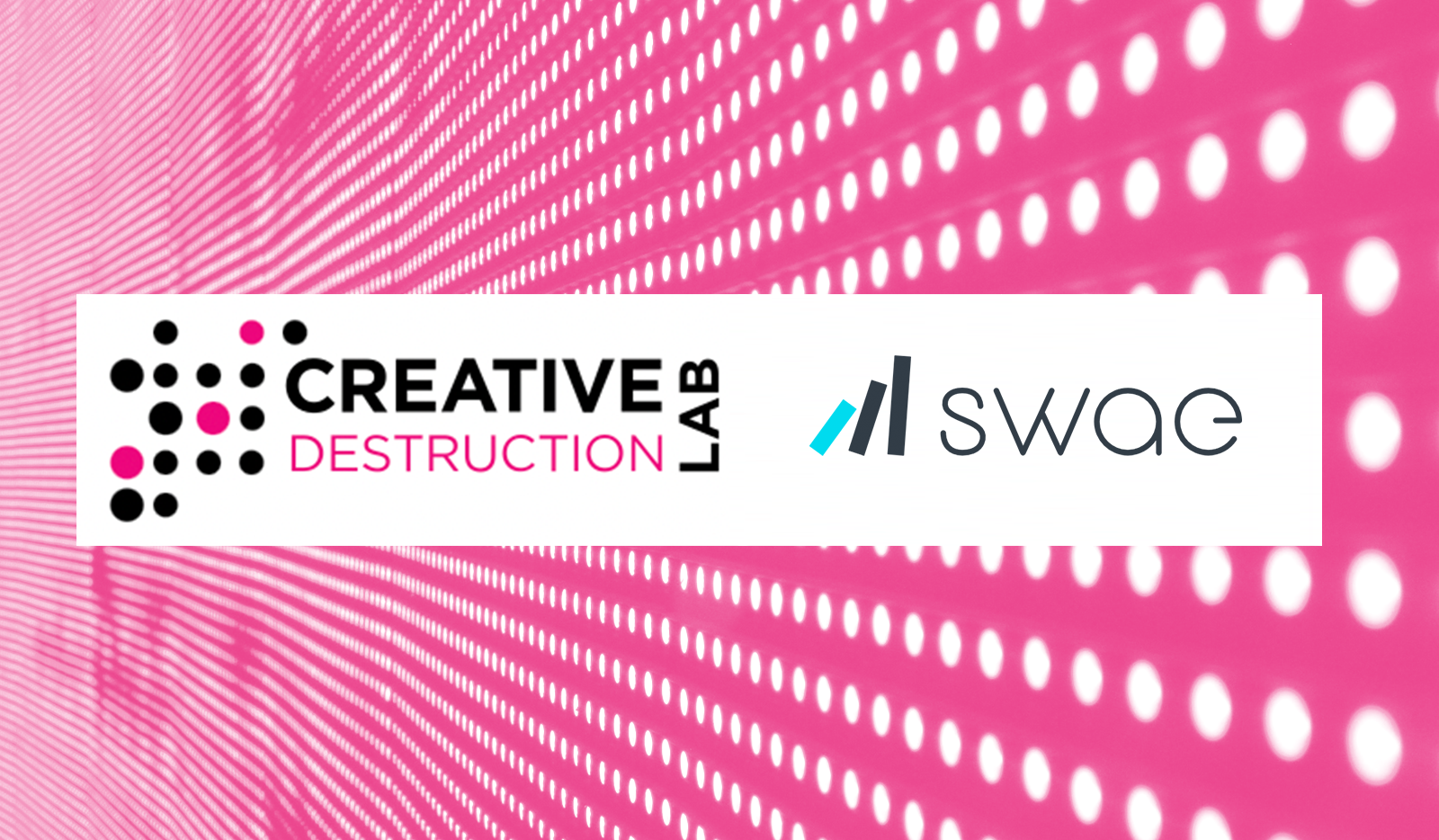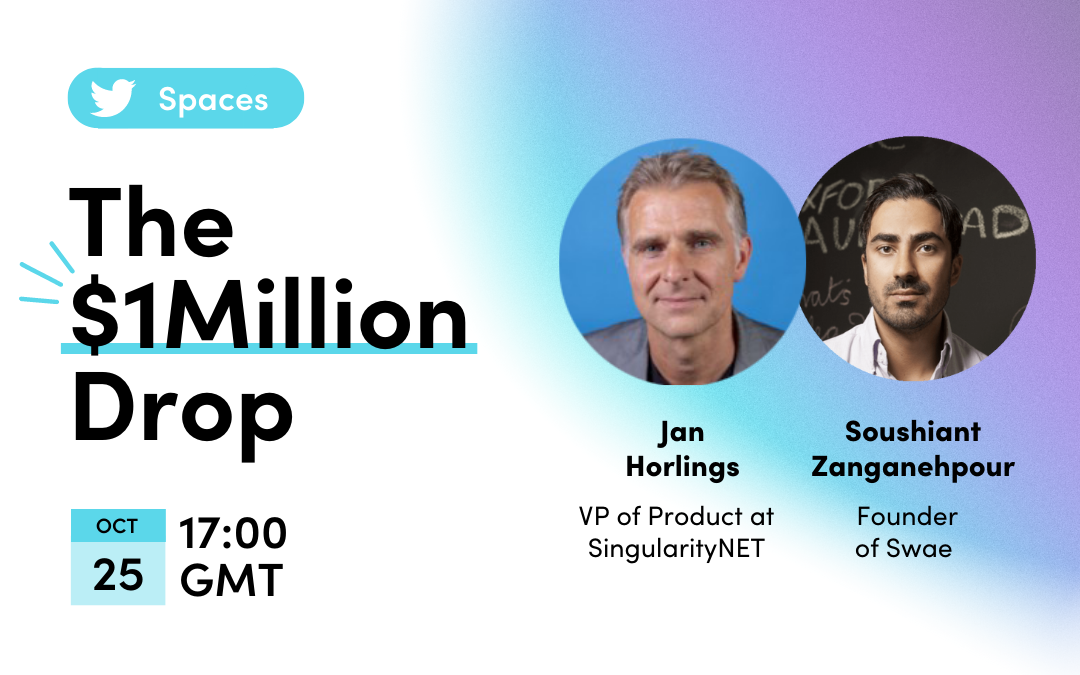Thanks to Covid 19 and the ensuing the market volatilities and revamped nature of work, the need for such a wake up, to create an environment of psychological safety and inclusion, to create a system that helps organizations listen at scale, to hear as many voices as possible (instead of the loudest or most powerful few at the top), to source creative solutions to new problems and enable good ideas with meaningful action, is more important today than ever before.
“In today’s era, there really is no excuse for organizations and leaders not to leverage the available but untapped collective intelligence that resides within them. We have the technology to do this efficiently, research shows that crowdsourcing reveals high enough quality of solutions to problems to be worthwhile, and modern culture has progressed enough so people expect this level of transparency and inclusion in the decision making process, especially decisions that have a big impact on their lives. Leaders and organizations that fail to listen and update their processes to meet the world where it is and where it’s headed will be left behind. No one wants a part of the outdated reality they have to offer.” says Soushiant Zanganehpour, founder and CEO of Swae
But the Covid-19 pandemic did not discriminate between organizational types. Swae nearly went under.
Covid-19 & its Impact on all Organizations
As it generally goes, building a tech startup or any startup for that matter is indeed a roller coaster ride. Building a tech startup during a global pandemic brought a level of challenge I had never faced in my life before. At the outset of Covid-19, Swae was thrown into a number of crises, and had to overcome many headwinds to adapt itself to the new reality. We’ve had a lot of learnings since our 2019 launch. The challenges that hit when 2020 came all centered around planning and maneuvering through massive uncertainty – uncertainty about what our clients were going through and if they had the available budgets to invest in our solution; uncertainty about where funding would come from and how to fundraise without in-person roadshow and meetings; uncertainty about the impact of the pandemic on recruiting global talent and team formation; and uncertainty about how to grow a team and instill the right culture while being entirely remote!
“Since 2019, the landscape and market we’ve entered has changed in ways that I couldn’t have predicted. Covid-19 came and hit everyone like a wrecking ball; the workplace instantly became remote, and decision-making, team collaboration, and innovation (the things that Swae does) are now far more complex and fragmented than we ever imagined before. The toll the pandemic has had on people on all levels means what we do for employees (and leaders) is so much more profound. This shift certainly forced us to re-evaluate and reinvent how we support organizations, and we’re far stronger for it. ”
Initially we resisted the changes thrown unto us but learned quickly not to fight them. We reminded ourselves that we aren’t the only company that was massively affected during these highly unstable times, and it ended up being an opportunity for us to get really clear on what we’re doing and how to overcome big hurdles as a team. Embracing the uncertainty helped us find solutions and come a long way.
Top 5 Challenges Faced and Lessons Learned
From all the ups and downs we went through resulting from Covid-19, to some early learning moments predating Covid, here are the top 5 challenges we endured since launching Swae, how we overcame them, and what we learned about about hiring, team formation, strategy, as well as ways to enhance the technology.
Losing Anchor client at the outset of the Pandemic
At the outset of Covid 19, we lost our first and largest paying customer, Etihad Airlines. When the wrecking ball of Covid came crashing in, the impact on global airlines was swift, immediate, and painful. Etihad saw an 80% reduction in sales and canceled all major enterprise contracts to reduce their bleed, including ours.
Our entire pipeline of enterprise deals also went up into thin air as well. Covid-19 indefinitely delayed the start of many projected client projects and or made the business case challenging to argue for.
Mitigation & Lessons Learned
To respond, we quickly turned on a dime to minimize our burn rate and preserve cash flow. To replenish our lost projected cash flows, we began applying for grants and thinking of new markets for our product. We eventually leveraged government support and grants to help us recover 40% of the lost revenue to manage through this period of uncertainty.
Knowing we weren’t the only ones facing difficult times, we understood that many organizations and local governments were struggling to adapt to virtual, all-digital, decision-making during this prolonged period of uncertainty. We came together and began brainstorming more immediate and shorter use cases of Swae. From listening to clients, we learned that people could use Swae to manage remote annual general meetings and even use it to crowdsource content and agendas for virtual meetings and events. We felt there was a way to adapt our core product to be more nimble to launch and easier to configure, to help others while allowing us to earn short term revenue. Two months after losing Etihad, in May 2020, we launched three complementary products to enable teams to make collective decisions over the internet quickly, conveniently, and safely. These include: 1) Swae for digital annual general meetings, 2) Swae for digital policy making and governance 3) Swae for remote team decision-making.
Losing Anchor funders at the beginning of the pandemic
In January 2020, we launched a $500K seed round and quickly closed the first $150K. As shared above, in February 2020, we also closed our first 6-figure annual commercial contract with Etihad Airways, after a year long pilot of our platform inside their organization. The year was off to a great start, so we thought. With enough investment closed and expected revenues from our first $ARR contract (as well as a pipeline of $500K-$1M worth of enterprise deals), we decided to pause our fundraise and instead focus on going to market with our product. Anyone who has built an early stage startup knows that fundraising is a very intense and distracting process, and we thought the time would be better spent closing new deals. Hindsight is 2020 (no pun intended)… When you have momentum, never stop! That was our biggest mistake. After we paused our round, in March, everything changed. Etihad canceled the contract and our entire pipeline of enterprise deals also disappeared, thanks to Covid. Now, with no anchor deal, and no pipeline of deals, how easy do you think it was to raise funds? When we tried to revive the fundraise two committed anchor investors immediately retracted their commitments to invest due to the impact of Covid on their portfolios, general cash availability, and the grim future that presented itself.
Their cancelled commitments combined with the comical series of other debacles SIGNIFICANTLY changed our cash flow projections and reality. One day, we were projecting more money than we needed, the other day we could barely fund ourselves. It was a vicious circle that would not cease. Without any new confirmed investment or revenues, we were projecting an end date of Swae for December 31, 2020.
Mitigations
With a clear end date in site, we knew we had to prolong our burn rate as long as possible. So we came together as a team and decided to restructure and opt to reduce our salaries as a last ditch attempt to save the company. Each of us came to the table with an open mind and depending on our individual situations, each offered to give up some portion of their salary they derived from Swae. The minimum amount reduced was 30% and most offered to give up 100% of their salaries. Instead of salary, the team would earn what they had sacrificed in equity with a sizeable risk premium and bonus. That seemed fair.
I took the first heavy paycut, then all other part-time contractors voluntarily contributed their entire salaries to Swae in exchange for equity. Finally, the leadership at our outsourced tech team bravely offered to contribute some engineers to our cause without pay for a long enough period to help us with ongoing client implementations and progress against our roadmap. This experience was a transformational and cathartic moment for us as a team. During a global pandemic, amidst all the uncertainties surrounding our individual lives, the team came together and collectively decided to do whatever we all could to keep the mission and dream of Swae alive. That experience brought everyone together in ways that superficial team building exercises simply don’t. When faced with crisis, the team stepped up. Until this day that moment acts as an an enormous source of mutual trust and kinship – like a binding agent between all of us. It’s cemented part of our culture that we simply don’t give up when we face adversity, and instead we come together to look for solutions. That crisis gave us a resounding amount of confidence to face the future, whatever it presents.
The internal restructuring allowed us to extend our runway by an additional 9 months, allowing us to get to the other end of 2020 and successfully enter 2021. During these turbulent months, a silver lining emerged. Investors stopped seeing Covid-19 as a massive interruption and began seeing the long term implications of it on the future of work and society. Instantly, many began to see Swae as a potential source of solutions for the new complexities of working remotely during a pandemic. The explosion and irreversible long term impacts of Remote Working, the accelerated adoption of digital tools, and new challenges associated with collaboration, maintaining engagement, and decision-making increased the projected market size and opportunity for remote collaboration tools from $18b to $60b (almost a 4x increase) from 2021-2024. This new framing of the needs of the future workplace began changing Swae’s market perception and only increased interest in Swae.
After a few short months, we were able to land our lead investor, Mr. William Eisenman, the former CTO and Head of Engineering of Netflix, and were able to finish raising our seed round and it was oversubscribed.
Parting ways with two different CTOs and still building a great product
We went through two (yes, two!) CTOs but still built the platform without that leadership position filled. Here’s the backstory: when Swae initially launched, I bootstrapped the company from my savings and we didn’t have a CTO. We used the limited resources we had and our intimate knowledge of the problem to outsource the build out of a prototype (the team that did it is the team we still work with to this day). At that time, our needs were basic.
After winning the New Shape Prize, getting a $750K non-dilutive injection of cash and some validation, we were ready to expand the team. We began recruiting for a CTO, searching for a strong technical lead, full stack developer, and AI programmer with expertise in Natural Language Processing to assume the responsibility of shaping our product, prototyping new features, building beautiful, consistent, scalable and intuitive software, and leading our AI development.
We received over 400+ applicants, and successfully hired a former Amazon Alexa Natural Language Generation Team Member, a Full Stack Developer + Architect (Natural Language Processing and Generation specialist), as our new CTO.
Unfortunately, after working with this individual for a short 7 week period, things did not work out as we had imagined. He was brilliant but the interpersonal fit was quite off. Our working styles and expectations about how to manage Swae became more incompatible over his short tenure.
Fast forward 6 months after his departure, we were able to find a more suitable CTO with the right balance of interpersonal, leadership and technical skills to be a better fit for what we needed. She helped improve the product and launched the newest version of Swae. Though she was with Swae for nearly 2 years, in May 2021, she also parted ways due largely to strong differences in opinion about the responsibilities and trade-offs of being a co-founder, the overall product experience, and the company’s direction.
Mitigations:
When we were recruiting for either CTO, we identified some red flags and the potential for some of the behaviors we saw later in the working relationship to arise, but we decided as a team to be practical – that we would try to manage these concerns as they came up. Truth was that we thought we really needed a CTO with the skill set they had to accomplish the technological goals we had in mind with the product, and we thought there skill set was a priority than fit. This was a costly mistake – something we will not repeat when our gut is telling us not to go ahead.
Though exhausting and expensive, we learned very valuable lessons in both cases about how to pick the people we want to work with. Moving forward, we only make hiring decisions if the gut feels right, and won’t compromise that intuitive feeling on being “sensible”. We will never make the same compromises we did previously because they are unsustainable.
Initially we panicked about the fact that we couldn’t build a tech platform without a strong technical lead. The experience of going through two CTOs and having to launch a product without them proved we were wrong. We realized instead that we could distribute the tasks of the CTO into the existing roles we had amongst our team. Distribution of responsibility, combined with strong spring defining, demo, and quality assurance processes meant we were able to develop new features and iterate the product consistently and affordably without needing to rely on a figure head.
With hindsight we also realized we were too early to need the skill set and seniority of a CTO, and instead could make similar progress with a strong senior developer instead. Adding the layer of CTO would only be relevant after a few more years of traction and progress of the product.
Without a CTO, the engineering process and team did not fall by the way side. The team stepped up on both ends (in Vancouver, and India), to ensure things remain on track, features are released under the expected conditions, and the platform relaunch timelines are met. To make up for the gap, we have instituted new processes and meetings that include more critical roles (like weekly demos by the engineering team, priority setting meetings that include design, product and engineering together, etc.)
Not having a CTO also allowed us to save a significant amount in monthly recurring salaries and expenses, to help prolong our burn rate.
At the moment, we don’t have a CTO. We decided that our ‘departments’ would be headless as we realized that we didn’t need a multi-layered C-level or VP-level role in every department of our startup. When everybody has a voice and everyone is equally accountable, this becomes the bottom-up way (or “Swae way”) to drive all the important aspects from marketing, sales, product development, and customer success and improvement. We’re doing some radical things and practicing what we preach.
“Ultimately, what we decided is that everyone has autonomy but everyone owns unique directives. Often things come back to me because the ultimate vision of any organization has to be driven by the core person(s) and I’ve been thinking about Swae and what it can be in this world for a much longer time than anyone else on the team. This has worked really well thus far and makes us much more responsive so we truly are practicing what we preach,” says Zanganehpour.
Lacking Essentials for Strategy and Go-to-Market:
As is typical in a startup’s initial launch phase, often there’s a lack of clarity in some key areas around marketing and sales. We had a bit of a rough start when we realized that we didn’t have some key strategic details fully fleshed out. Since Swae had so many use cases and was an organization and use case agnostic tool, we didn’t have a rigid and well defined understanding of who our ideal customer and archetype was. This lead us down the path of being everything to everyone initially, which is a perfect recipe for failure.
Mitigations:
Realizing this was a flawed approach, we invested time in gathering information and conducting research to create archetypes (or personas) of who we serve – this was critical to success. Once the archetypes were in place we began learning what objections people had to saying yes or no, and redesigned our pitch to address those upfront before we face long sales cycles that go nowhere real fast. Not having that sound structure led us to realize it was necessary to deeply understand the people that we need to connect with, and understand how to work through the objections. We’re making these powerful changes for our sales and marketing output to help us make a larger impact overall.
- Fundraising and Hiring Remotely: Fundraising without face to face meetings was much more challenging than anticipated, as was building a team totally remotely. When face to face interactions became undoable, we had to get to the core of creating important systems and building structures to support this effort. As most know, video conferencing is laborious and taxing as well. Anything else here?
“Even with these challenges, we were able to fundraise $750K CAD seed funding round – a 50% increase from the initial $500K offer from some notable investors and we’ve got the financial runway to build a MVP of our platform and really move forward in a more progressive manner. And we’ve been able to grow a solid team that is now in place as of 2022, even though we had retracted twice since 2019 given market challenges and global uncertainties due to the pandemic,” says Zanganehpour.
The Future of Swae and the Creation of More Inclusive Bottom-Up Organizational Models
2022 Milestones for Swae
With these great lessons behind us and more important insights to face head on, over the next year we expect:
- To grow revenues to $1M+ ARR
- To double our team from 8 to 16 people
- To grow the platform user base from 40K to 100K+ users
- To add significant features to the core platform including Chats, Polls, and Brainstorms
- To add to proprietary features to our existing AI algorithms, including bias detection and evidence suggestion features
- To add important integrations such as MS teams, Slack, and other collaboration platforms.
- To launch a second product based on the core feature set tailored more to use cases in Web3, DAOs and participatory governance in Crypto projects
- To partner with some smart cities to launch citizen engagement, bottom-up and participatory policy making initiatives
- And many more…
At the core, Swae’s mission stayed the same; to give everyone an equal voice in raising solutions and shaping decisions, allowing organizations (even government systems) to uncover and benefit from the untapped collective intelligence from within, through a robust and innovative idea management and bottom-up decision-making platform.
The sheer pace of adaptation to change that’s required of organizations today thanks to Covid-19 has set the scene for Swae. Our three biggest use cases include collaboration during remote work, increasing collaboration without unwanted noise, and building more inclusive cultures supporting growth and DEI initiatives. All of these points are extremely important in today’s organizational realities, no matter the company size.
The ROI of Swae so far
Over the past 12 months, the results from implementing Swae for various clients speak for themselves and this has made us more proud than anything else during such harsh times. Some of our clients include the United Nations, LifeLabs, Etihad Airways, and more.
Having compiled results from over 40,000 unique users and several large organizational pilots from around the world that demonstrates we’re delivering on our promises – even though we’re just getting started. Some of the great things that have come back to us:
- $5M+ USD – the value of innovation ideas that have been sourced through Swae (so far).
- $1M USD – average value of innovation pipeline developed over 12 months
- 200K+unique collaboration exchanges have happened between Swae’s users.
- 94% of users polled say Swae increased their engagement, motivation and happiness by helping them have a meaningful voice in decisions.
- 90% of users polled claim Swae surfaced ideas that would not have otherwise surfaced using other available collaboration tools.
- 84% of users polled say Swae made idea sharing and collaboration easier & more accessible to their whole community
- 3-months is the payback period – either resulting from cost savings ideas generated from the platform, revenue generating ideas sourced from the platform for investment and development, or efficiencies resulting from replacing more manual idea management and decision-making tools.
- 70% increase in engagement (compared to other experiments and efforts to date)
While Swae is all about helping organizations shed more light on their challenges and providing a reliable platform where they can source ideas from the people within to create more inclusive cultures and a more equal playing ground, we do have a more grandiose vision that is the next evolution of our technology.
“Swae is ultimately designed to inspire ideas and stimulate debate around new, more effective forms of global cooperation at the highest levels in the biggest governments whether it be in cities, states or countries. We must realize that our system is no longer fit for our new age and we need new actors, new operating assumptions, and new norms to help reframe our priorities and uphold humanity-first, and nations second.
We need new processes and improved participation methods in order to create new solutions that prioritize and give political weight to ideas that advance humanity, preserve and benefit all in our species, above a narrow set of national self-interests. This can happen using the foundation we’ve built for Swae and will be our next big evolution of the technology we’ve built,” says Zanganehpour.
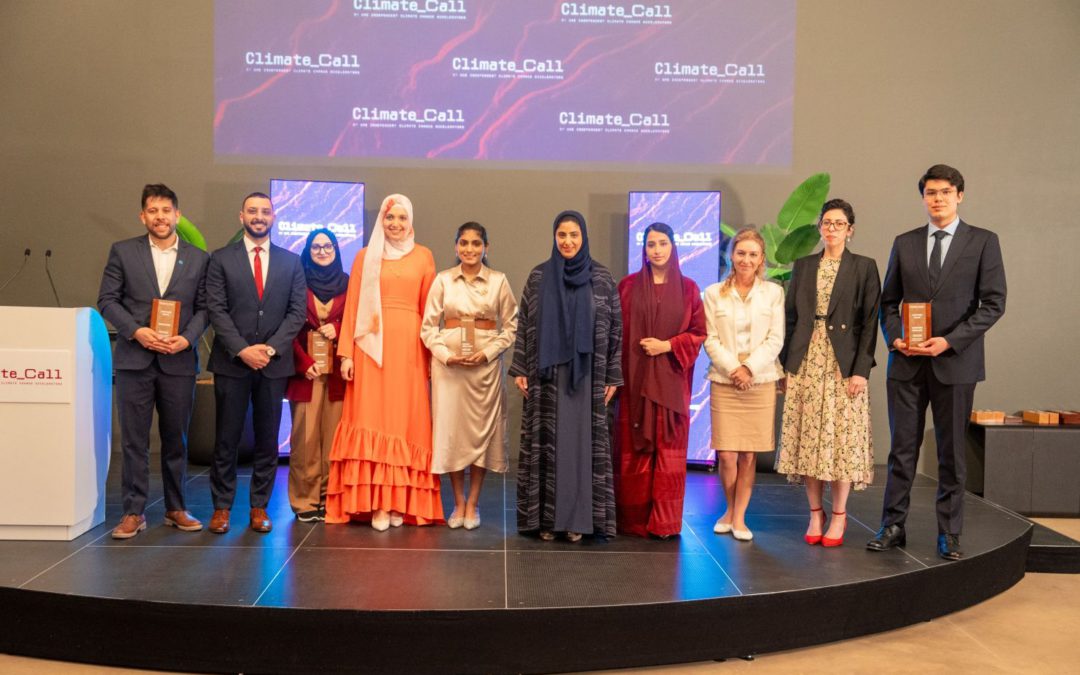
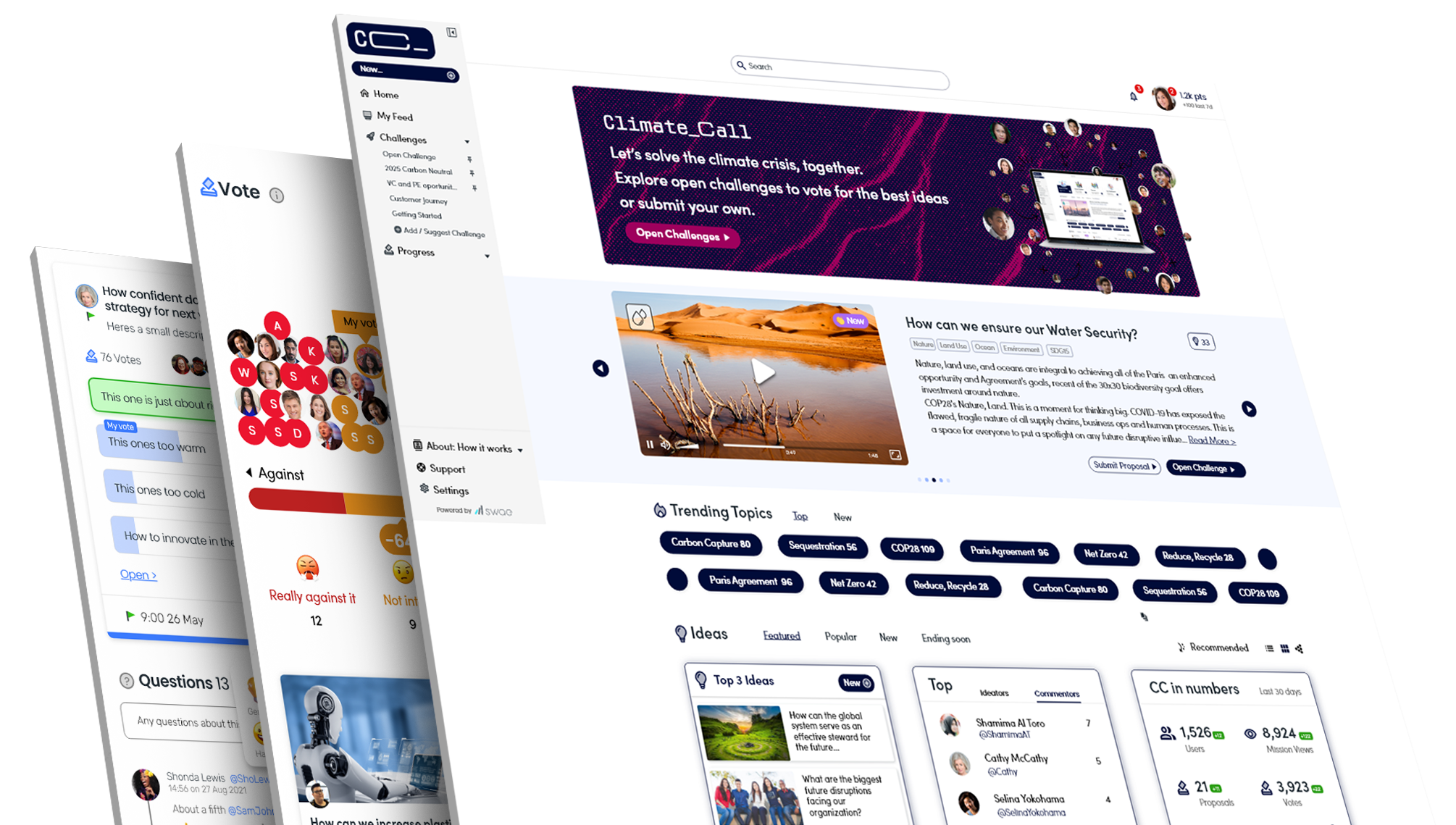
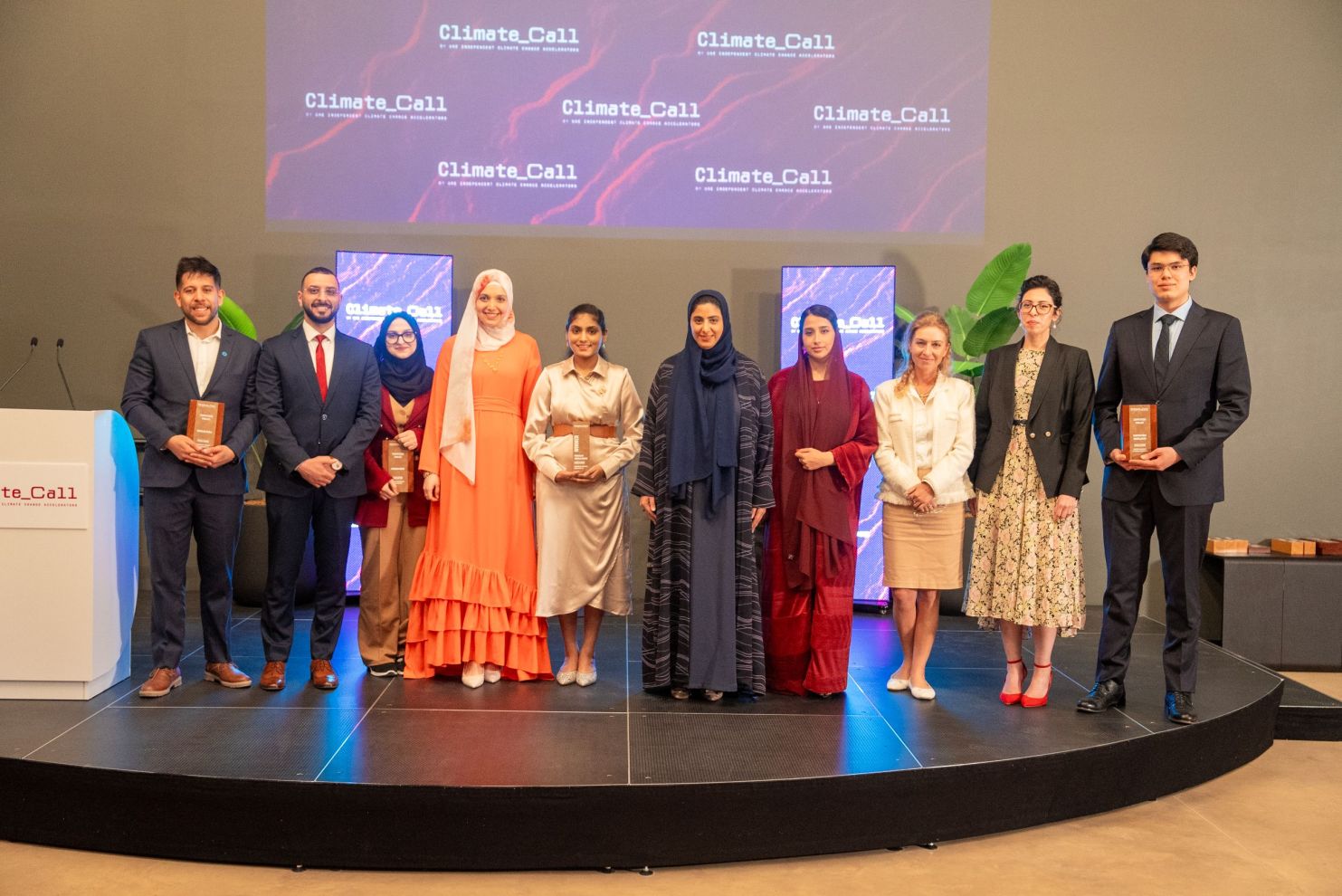
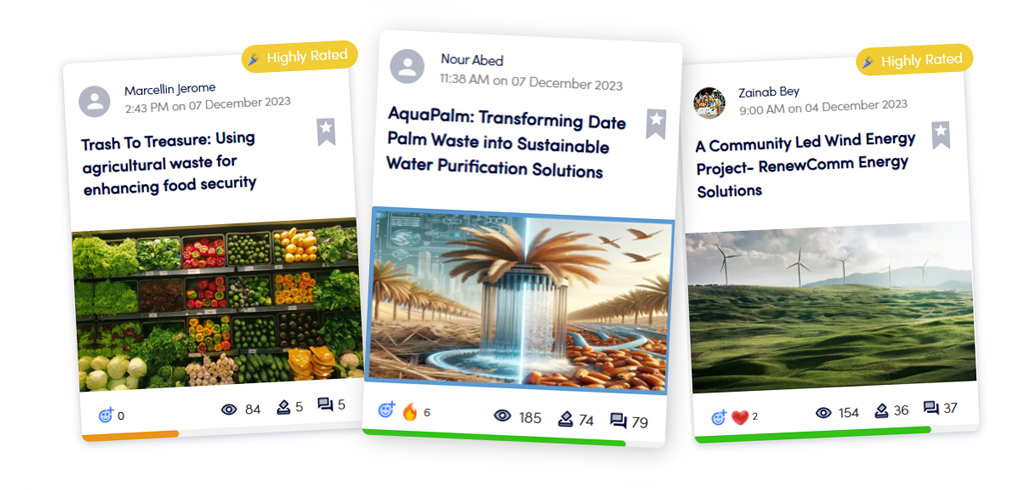
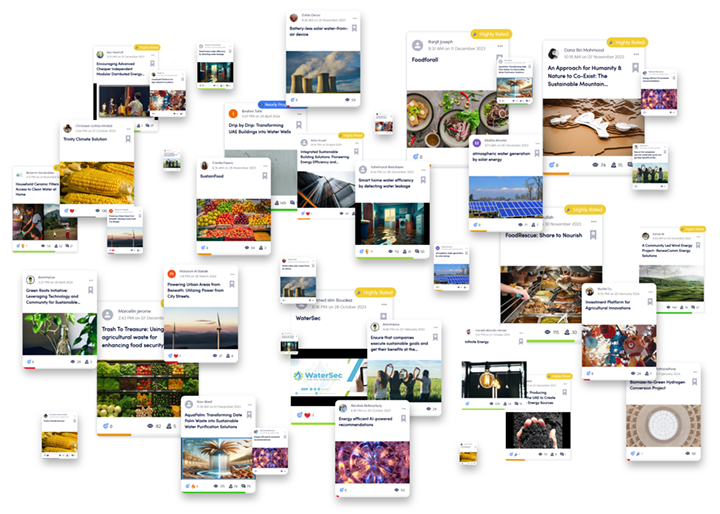
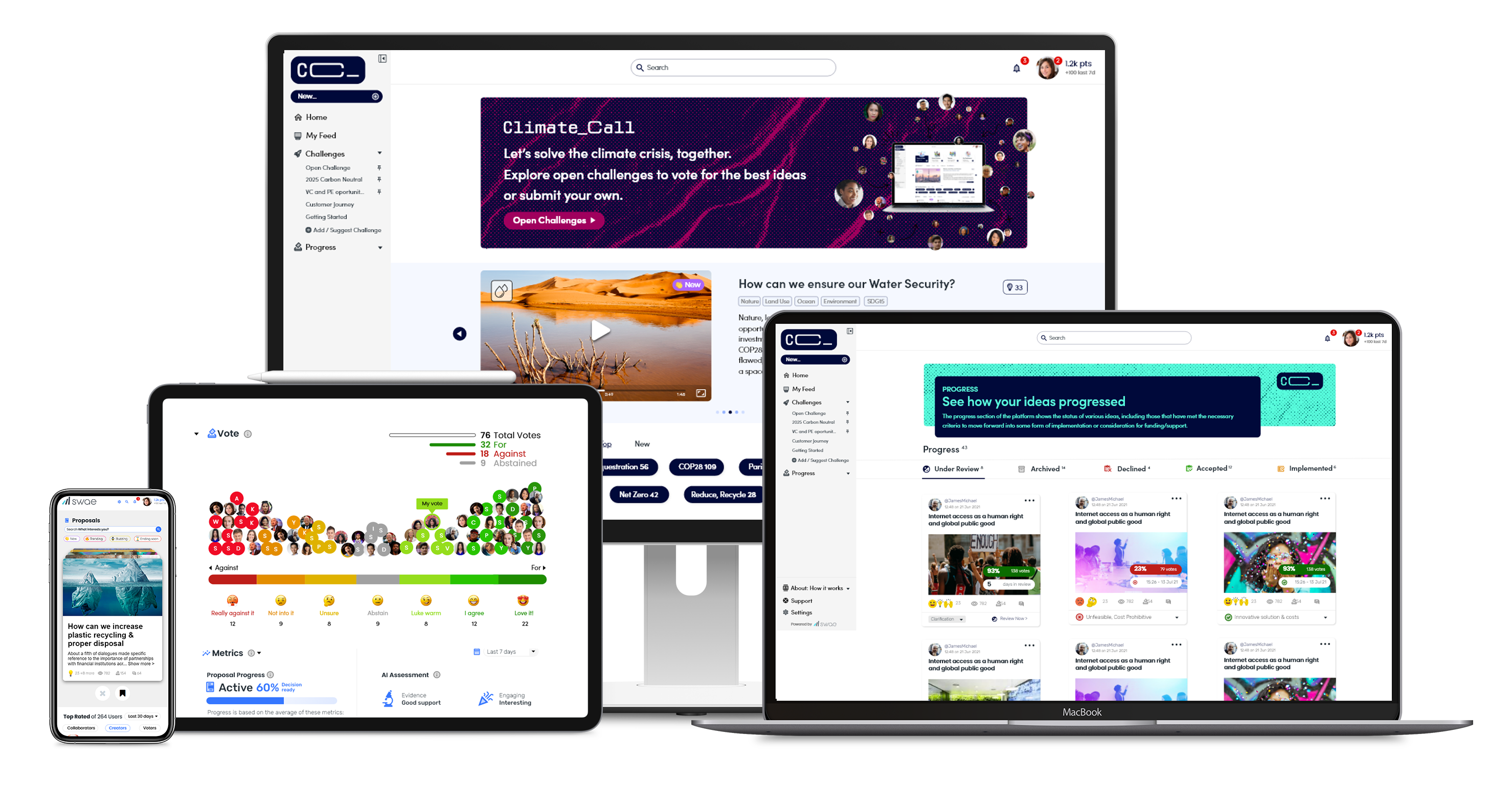




![How to be seen as a Brilliant and Bold Leader [Become a great Communicator]](https://swae.io/wp-content/uploads/Resources_Swae_Harvard_Business_review_How-to-Be-Seen-as-a-Brilliant-and-Bold-Leader-Become-a-Great-Communicator-400x250.png)

![Many Companies Are Hiring Immediately [Research Shows People Desire Better Workplaces]](https://swae.io/wp-content/uploads/Rew_Research_Swae_Many-Companies-Are-Hiring-Immediately-Research-Shows-People-Desire-Better-Workplaces-1-400x250.png)
